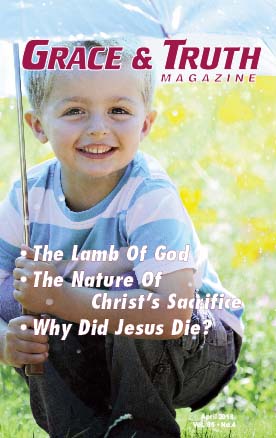 Answered by Eugene P. Vedder, Jr.
Answered by Eugene P. Vedder, Jr.
QUESTION: What are the differences between paradise, Abraham’s bosom, heaven and the Father’s house? And what are the differences between sheol, hades, hell and the lake of fire?
ANSWER: These are not eight different places or states of being. Instead, they are names for two very different sets of destinations – either one of which every person will reach after his death. There is a certain overlap within each set, but the sets are absolutely distinct from each other. Each member of the first set refers to a place or a condition of absolute bliss, while each of the second set is just the opposite: absolute torment. Let’s look briefly at these terms.
• Paradise. This is a term of Oriental, probably Persian, origin, meaning a park or place of pleasure. The Septuagint translation of the Old Testament from Hebrew into Greek uses this term in reference to the garden of Eden, the place God made for man’s enjoyment. In the New Testament, the Lord used it in speaking to the repentant thief on the cross (Lk. 23:43), Paul used it in describing his amazing experience of being caught up into the third heaven (2 Cor. 12:4), and the Lord used it in the letter to the angel of the church at Ephesus (Rev. 2:7).
• Abraham’s bosom. This is a term commonly used by the Jews at the time the Lord lived on earth to denote, or indicate, the part of sheol where the souls of the righteous were taken after death. They believed that Abraham, the friend of God, their forefather, was in the highest place of bliss. The Lord used this well-known term for heaven when He spoke of the contrasts between the rich man and Lazarus in Luke 16:19-31. He thus made it clear that while both rich and poor, believers and unbelievers die, their future after death is not the same.
• Heaven. In God’s Word, heaven is always viewed as the contrast to earth. The heavens are usually viewed in one of three ways:
- The atmosphere in which birds fly and rain falls;
- Outer space where are the sun, moon and stars; and
- The heaven of heavens, where the throne of God is and from where our Lord Jesus, the Son of God, came down to earth. Heaven in Scripture is regarded as God’s dwelling place and the source of all blessing. It is the destination of believers after death or the rapture, though usually other terms are used in describing it.
• The Father’s House. The Lord Jesus used this expression in John 14 when speaking of heaven to His disciples on the night of His betrayal. This term shows us the intimacy and love connected with our place in heaven. In the Father’s house are many dwelling places, He assured His disciples, and He was going to prepare a place there for them – and us. The dwelling places were there, but they were not yet ready. He would prepare them by dying on the cross, rising from the dead, ascending back into heaven and taking His place at God’s right hand. Because He is there, we shall be there also. Now we can call God our Father, something believers in the Old Testament were never able to do. Such is the intimacy we now enjoy with God through the work accomplished by our Lord Jesus.
• Sheol. Such intimacy was completely unknown to believers in the Old Testament. Some, such as Job in chapter 19:25-27 of the book called by his name and David in 2 Samuel 12:22-23, by faith gave expression to a confidence that went beyond any knowledge they had of what lay beyond death. Ecclesiastes makes plain that even the wisest of men at that time had no real understanding of the future after death. The bodies of the dead were laid in graves, and souls and spirits were spoken of somewhat vaguely as being in sheol. Not having any clear teaching about sheol meant that death was generally faced with a measure of dread. Now that the Lord Jesus has related the story of the rich man and the beggar Lazarus, we have clear teaching that sheol had two compartments – one for the righteous, the other for the unrighteous – with a great gulf that could not be crossed between them. Whether men realize it or not, God has always differentiated between those who are His and those who seek to live independently of Him.
• Hades. Hades is the Greek New Testament equivalent of sheol in the Hebrew Old Testament: the place or condition of the soul and spirit after death in contrast to the grave, the place where the dead body was laid. It had unpleasant connotations, or implications. The torment of the unsaved, wicked individual begins immediately after his death even though his soul and spirit are separated from his body. Every part of the wicked person constantly feels this torment. The person feels he is tormented in flame. He remembers his life, with the good things and opportunities he had to believe God. He is conscious too of the finality of his torment, being eternally separated from God.
• Hell. At present, contrary to the thinking of poets and of most people today, hell is still unpopulated. This place of eternal separation from God was not created for mankind to begin with, but for Satan and his angels. Yet, people who reject or neglect the great salvation God freely offers them will have their part with Satan there, eternally separated from God, who is holy. The unsaved dead will be raised after the fiery end of the huge army Satan will muster up after being released from the imprisonment he will experience during the millennium – the coming 1,000-year-long rule of our Lord Jesus Christ. According to Revelation 20, this army of Satan’s will march toward the camp of the saints of that day and the beloved city. But, just as the military force approaches, it will be consumed by fire sent out of heaven from God. This is to be followed by the wicked dead being raised and judged at the great white throne, before they are cast into hell forever.
• Lake of Fire. This is one of the descriptions of hell given to us in Scripture. In fact, this lake is said to burn with fire and brimstone, or sulfur. Sulfur burns with a dark flame that is almost purple in color, and it is most painful if it gets onto one’s skin. Unsaved people sometimes speak jokingly about hell as though they would have a good time there with all their friends. Others will angrily tell someone else to go to hell. The Lord tells us that hell is unquenchable, and it is a place of outer darkness, weeping, wailing and gnashing of teeth. This shows us that there is no such thing as fellowship with others in hell. Worst of all, it is a place of eternal banishment from the presence of God. The Greek word for hell is Gehenna, a name derived from the Valley of Hinnom outside Jerusalem where apostate Jews once burned their children as sacrifices to idols, and where later the garbage of Jerusalem was burned in a fire that was kept burning continually.
This lake of fire is a place to avoid by all means! God did not intend for mankind, whom He placed at the head of His creation, to go there. Rather, He gave His only-begotten Son to die for us on Calvary that we might be saved and enjoy the bliss of the Father’s house forever. Choose today. Choose wisely; accept God’s offer of free salvation through His Son Jesus Christ!



 “For God so loved the world that He gave His only begotten Son, that whoever believes in Him should not perish but have everlasting life.” —John 3:16
“For God so loved the world that He gave His only begotten Son, that whoever believes in Him should not perish but have everlasting life.” —John 3:16  Answered by Eugene P. Vedder, Jr.
Answered by Eugene P. Vedder, Jr.

